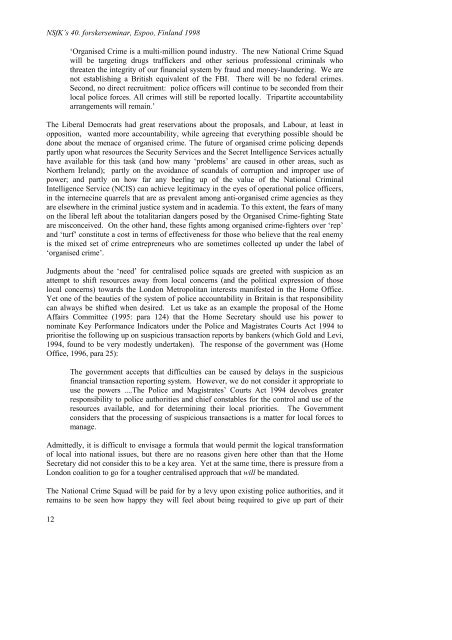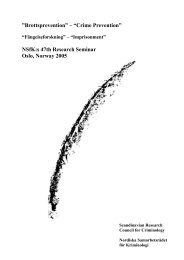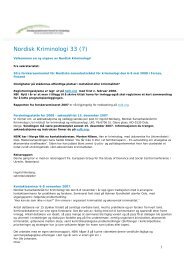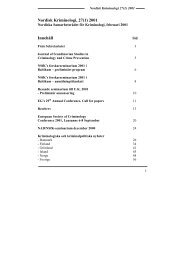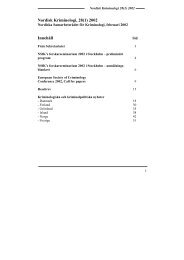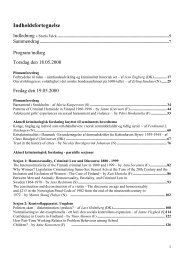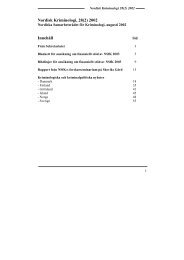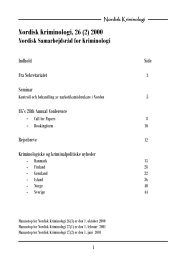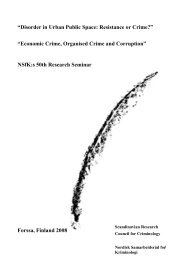Organised Crime & Crime Prevention - what works? - Scandinavian ...
Organised Crime & Crime Prevention - what works? - Scandinavian ...
Organised Crime & Crime Prevention - what works? - Scandinavian ...
Create successful ePaper yourself
Turn your PDF publications into a flip-book with our unique Google optimized e-Paper software.
NSfK’s 40. forskerseminar, Espoo, Finland 1998<br />
12<br />
‘<strong>Organised</strong> <strong>Crime</strong> is a multi-million pound industry. The new National <strong>Crime</strong> Squad<br />
will be targeting drugs traffickers and other serious professional criminals who<br />
threaten the integrity of our financial system by fraud and money-laundering. We are<br />
not establishing a British equivalent of the FBI. There will be no federal crimes.<br />
Second, no direct recruitment: police officers will continue to be seconded from their<br />
local police forces. All crimes will still be reported locally. Tripartite accountability<br />
arrangements will remain.’<br />
The Liberal Democrats had great reservations about the proposals, and Labour, at least in<br />
opposition, wanted more accountability, while agreeing that everything possible should be<br />
done about the menace of organised crime. The future of organised crime policing depends<br />
partly upon <strong>what</strong> resources the Security Services and the Secret Intelligence Services actually<br />
have available for this task (and how many ‘problems’ are caused in other areas, such as<br />
Northern Ireland); partly on the avoidance of scandals of corruption and improper use of<br />
power; and partly on how far any beefing up of the value of the National Criminal<br />
Intelligence Service (NCIS) can achieve legitimacy in the eyes of operational police officers,<br />
in the internecine quarrels that are as prevalent among anti-organised crime agencies as they<br />
are elsewhere in the criminal justice system and in academia. To this extent, the fears of many<br />
on the liberal left about the totalitarian dangers posed by the <strong>Organised</strong> <strong>Crime</strong>-fighting State<br />
are misconceived. On the other hand, these fights among organised crime-fighters over ‘rep’<br />
and ‘turf’ constitute a cost in terms of effectiveness for those who believe that the real enemy<br />
is the mixed set of crime entrepreneurs who are sometimes collected up under the label of<br />
‘organised crime’.<br />
Judgments about the ‘need’ for centralised police squads are greeted with suspicion as an<br />
attempt to shift resources away from local concerns (and the political expression of those<br />
local concerns) towards the London Metropolitan interests manifested in the Home Office.<br />
Yet one of the beauties of the system of police accountability in Britain is that responsibility<br />
can always be shifted when desired. Let us take as an example the proposal of the Home<br />
Affairs Committee (1995: para 124) that the Home Secretary should use his power to<br />
nominate Key Performance Indicators under the Police and Magistrates Courts Act 1994 to<br />
prioritise the following up on suspicious transaction reports by bankers (which Gold and Levi,<br />
1994, found to be very modestly undertaken). The response of the government was (Home<br />
Office, 1996, para 25):<br />
The government accepts that difficulties can be caused by delays in the suspicious<br />
financial transaction reporting system. However, we do not consider it appropriate to<br />
use the powers ....The Police and Magistrates’ Courts Act 1994 devolves greater<br />
responsibility to police authorities and chief constables for the control and use of the<br />
resources available, and for determining their local priorities. The Government<br />
considers that the processing of suspicious transactions is a matter for local forces to<br />
manage.<br />
Admittedly, it is difficult to envisage a formula that would permit the logical transformation<br />
of local into national issues, but there are no reasons given here other than that the Home<br />
Secretary did not consider this to be a key area. Yet at the same time, there is pressure from a<br />
London coalition to go for a tougher centralised approach that will be mandated.<br />
The National <strong>Crime</strong> Squad will be paid for by a levy upon existing police authorities, and it<br />
remains to be seen how happy they will feel about being required to give up part of their


